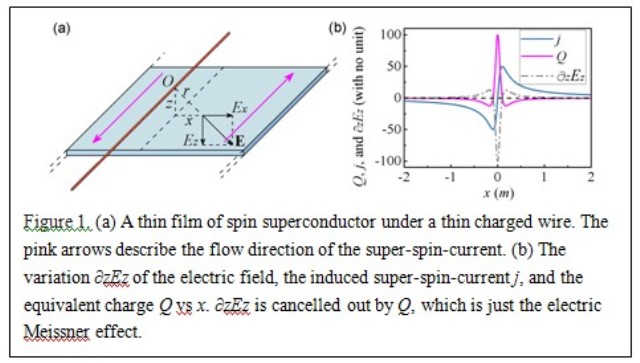Dec 24 2013
Superconductivity was discovered by Onnes about a century ago, and is still an important discipline in physics. It not only promotes the development of physics, but also has extensive applications and improves the living standards of people.
The superconductors have two basic properties: one is the zero resistance which means that a current can flow without dissipation; the other is the Meissner effect which says that superconductors can screen magnetic fields. Moreover, there are many other important phenomena related to superconductivity, such as Josephson effect, magnetic flux quantization, etc. Theories describing superconductivity contain the BCS theory, the Ginzburg-Landau (GL) theory, the London equations, and so on.

As we know that electrons have both charge and spin degrees of freedom. The properties of materials related to charge degree of freedom have been studied for a long time, while the properties related to spin are less studied. However, many useful properties related to the spin degree of freedom have been discovered in this decade, thus this field has drawn more attentions and has experienced a great development. Some effects related to spin, which can be seen as the analogues of effects related to charge, have been found. For instance, the quantum spin Hall effect (topological insulator) is the analogue of the quantum Hall effect.
As pioneers, Professors Qingfeng Sun and Xincheng Xie in International Center for Quantum Materials, Peking university, proposed the concept of spin superconductivity for the first time in 2011 [Phys. Rev. B 84,214501(2011); Phys. Rev. B 87,245427(2013)]. Spin superconductor is a novel type of macroscopic quantum state, which is the analogue of conventional charge superconductor. The spin superconductors also have two basic properties. One is zero spin resistance which means that the spin current can flow without dissipation, but no electric current can flow in a spin superconductor. The other is the electric Meissner effect which says that spin superconductors can screen the variation of electric fields. Additionally, the authors derived the London-type equations, BCS-type theory and spin-current Josephson effect of spin superconductors.
Moreover, they pointed out that ferromagnetic graphene (or graphene in a high magnetic field), some three dimensional ferromagnetic materials, 3He and Bose-Einstein condensates of magnetic atoms may turn into spin superconductors at sufficient low temperature.
Recently, Dr. Zhiqiang Bao, Professors Xincheng Xie and Qingfeng Sun derived the GL-type theory of spin superconductivity, and shown that the second GL-type equation is equivalent to the generalized London-type equation. It should be pointed out that this GL-type theory is universal, and can be used to explore different kinds of properties of various spin superconductors.
In addition, the authors used the GL-type equations to calculate the super-spin-current in a spin superconductor under the electric field induced by a thin conducting wire (see Figure 1), and verified the electric Meissner effect. Furthermore, they analyzed three characteristic parameters of spin superconductors by the GL-type equations, and predicted the AC spin-current Josephson effect in which a time-independent magnetic field can induce a time-dependent spin current. This work was published in Nature Communications. 4, 2951 (2013).
The work listed above may open up a new discipline in physics.
The work was supported by National Basic Research Programs of China and National Natural Science Foundation of China.
Source: International Center for Quantum Materials
Edited by: Zhang Jiang